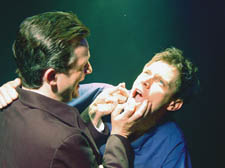|
|
 |
| |

Orwell: a celebration |
Unravelling this brainy farce is quite a science
ORWELL: A CELEBRATION
Trafalgar Studios
The celebration begins with Coming Up for Air, set in quintessential pre-war suburban England with George Bowling (Hal Cruttenden), a chubby insurance salesman, disgruntled by marriage and fatherhood and resigned to his mundane existence.
Cruttenden’s performance has a rare and palpable warmth, deftly taking us on a journey of childhood reminiscence and the simple pleasures of life as a boy in rural England. Despite not being immediately recognisable as “Orwellian” in its smooth and temperate feel, this first piece is a gentle reminder of the self-determination and unwavering need to challenge the memories of a once free youth in the face of a discernible expansion of social order and control.
The second half begins with two shorts, both recognising Orwell’s time spent in Burma. Ben Porter recounts the dilemma of the unprincipled, brutal killing of an elephant just to avoid a public embarrassment by an expectant Burmese crowd. Similarly poignant, yet intensely unnerving, Alan Cox describes the hanging of a man, putting us in a state of discomfort and antipathy towards the reality of taking a human life.
We are reminded of Orwell’s deeply felt humanity and regard for the nobility of human spirit in the face of an oppressor, as the condemned man side steps in a puddle on the way to his death. The second half culminates in a tortuous interrogation scene from Nineteen-Eighty-Four where Porter and Cox come together in the dismantling of a man, of his autonomy of mind and body, revealing a ubiquitous truth about human nature’s potential for control and destruction of others weaker than themselves.
Despite a near-empty stage with an absence of props, careless lighting extraneous to the performances and only the mere whisper of inconsequential sound effects, Dominic Cavendish does indeed celebrate Orwell, and imparts to his audience a recognition that the integrity of Orwell’s convictions remain profoundly relevant and necessary to the present day as much as they did 70 years ago.
Until July 4
020 7432 4220
|

|
 |
|
|
 |
|



